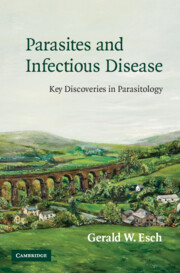Book contents
- Frontmatter
- Contents
- Preface
- Prologue
- 1 African trypanosomes and their VSGs
- 2 Malaria: the real killer
- 3 The HIV–AIDS vaccine and the disadvantage of natural selection: the yellow fever vaccine and the advantage of artificial selection
- 4 Lyme disease: a classic emerging disease
- 5 The discovery of ivermectin: a ‘crapshoot’, or not?
- 6 “You came a long way to see a tree”
- 7 Infectious disease and modern epidemiology
- 8 The ‘unholy trinity’ and the geohelminths: an intractable problem?
- 9 Hookworm disease: insidious, stealthily treacherous
- 10 The spadefoot toad and Pseudodiplorchis americanus: an amazing story of two very aquatic species in a very dry land
- 11 The schistosomes: split-bodied flukes
- 12 Dicrocoelium dendriticum and Halipegus occidualis: their life cycles and a genius at work
- 13 Trichinosis and Trichinella spp. (all eight of them, or is it nine?)
- 14 Phylogenetics: a contentious discipline
- 15 Toxoplasma gondii, Sarcocystis neurona, and Neospora caninum: the worst of the coccidians?
- Summary
- Index
- References
5 - The discovery of ivermectin: a ‘crapshoot’, or not?
Published online by Cambridge University Press: 24 November 2009
- Frontmatter
- Contents
- Preface
- Prologue
- 1 African trypanosomes and their VSGs
- 2 Malaria: the real killer
- 3 The HIV–AIDS vaccine and the disadvantage of natural selection: the yellow fever vaccine and the advantage of artificial selection
- 4 Lyme disease: a classic emerging disease
- 5 The discovery of ivermectin: a ‘crapshoot’, or not?
- 6 “You came a long way to see a tree”
- 7 Infectious disease and modern epidemiology
- 8 The ‘unholy trinity’ and the geohelminths: an intractable problem?
- 9 Hookworm disease: insidious, stealthily treacherous
- 10 The spadefoot toad and Pseudodiplorchis americanus: an amazing story of two very aquatic species in a very dry land
- 11 The schistosomes: split-bodied flukes
- 12 Dicrocoelium dendriticum and Halipegus occidualis: their life cycles and a genius at work
- 13 Trichinosis and Trichinella spp. (all eight of them, or is it nine?)
- 14 Phylogenetics: a contentious discipline
- 15 Toxoplasma gondii, Sarcocystis neurona, and Neospora caninum: the worst of the coccidians?
- Summary
- Index
- References
Summary
Healing is a matter of time, but it is sometimes also a matter of opportunity.
The Physician's Oath, Hippocrates (460–377 b.c.)What is ivermectin? Chemically, and technically, ivermectin is aligned with a family of “16-membered macrocyclic lactones with a disaccharide attached at the carbon-13 position” (Campbell, 1989). Scientists at Merck, Sharp & Dohme Research Laboratories (MSDRL) in Rahway, New Jersey, initially isolated it. These molecules most closely resemble milbemycins, discovered in Japan and first thought to have toxic effects just for mites. It is now known that these drugs are effective against certain parasitic nematodes as well. Biologically, ivermectin is a broad-spectrum anthelmintic, acaricide, and insecticide.
For me, the story of this drug's discovery is an interesting tale, for a number of reasons. First, one of the folks deeply involved in it is an old friend of mine, Bill Campbell. I have known Bill for more than thirty years. Second, before I began writing this essay, I knew very little about this sort of applied research. So, I had to sit down and do some serious reading. Quite honestly, I found it to be rather intriguing. Third, I was told by a colleague of mine, who should know, that ivermectin is considered by many in the agricultural industry almost as a miracle drug, primarily because of its toxic breadth for both ecto- and endoparasitic organisms.
- Type
- Chapter
- Information
- Parasites and Infectious DiseaseDiscovery by Serendipity and Otherwise, pp. 175 - 187Publisher: Cambridge University PressPrint publication year: 2007



